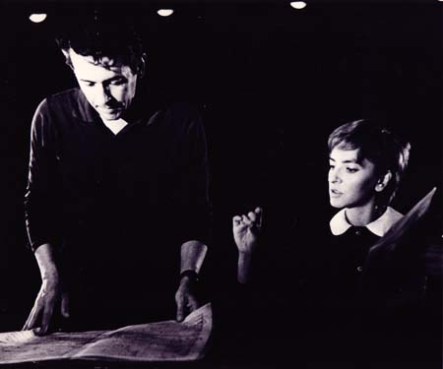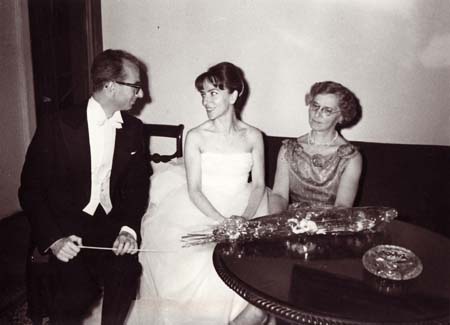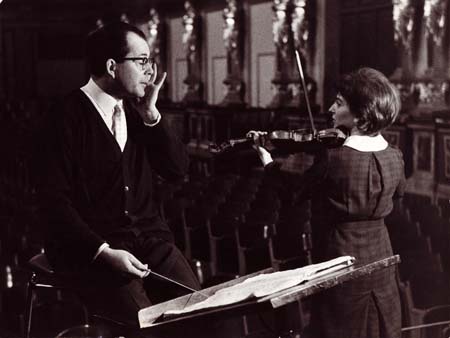Wanda Wilkomirska is one of the most influential and internationally acclaimed violinists of modern times; even now at the age of 78 she is very active as a teacher, both at the Sydney Conservatorium of Music and overseas. I was very privileged to be able to interview her.
What would you say have been the highlights of your career?
I would say there are many, so I can say it is not only “highlight”, it is also like the next step on the ladder; for example, the final concert in Wieniawski Competition which was 1952, when I first time played my Szymanowski First Concerto which later brought me lots of success. That was a highlight. Then, playing first concert in new rebuilt Warsaw, National Philharmonic in 1955. All this kinds of opening; like my first recital, the first recital ever given at the new [Sydney] Opera House.
My first recital in Wigmore Hall in London, when I was 21. My first concert with New York Philharmonic, for example. They are all highlights, and maybe only twice in my long life I had the kind of trance when playing that I only heard the first note – and then 25 minutes later, I heard my last notes, and I heard [cheering and applauding noises]. To open the new Barbican Hall in London with Sir Barbirolli conducting – those things, they are very important.
You studied in Poland, Hungary and Paris. How would you compare the three?
It’s difficult to compare, because in Poland I had several teachers…I graduated very early, when I was…seventeen…I noticed they really prepared soloists. But in Hungary, it was postgrads, and I had fantastic teacher, Ed Zathurecki, he was student of Hubay…and he opened me so many windows. But the last contact, in Paris, was not really like studies…I had a concert in Paris, with National Polish Orchestra, and Henryk Szeryng, he came behind the stage to the Green Room to us, and asked like this, “Why don’t you come and have lessons with me?” I told him, “First of all, I have no visa, and second I have no money.” So he told me, “Look, what you mean no visa, now you are here, you have two more concerts with the orchestra and then the orchestra goes back and you stay here.” And then afterwards, he did some hocus-pocus, I don’t know, abracadabra with the Consulate, that I really stayed for three months…and he arranged for me some little room in some friends’ apartment and I has as many lessons as he could manage.

That must have been wonderful. – You have played in some of the best concert halls in the world. Do you have a favourite among these?
Well, that’s difficult to say, because I tell you, they are all so wonderful, and I played in so many. Concertgebouw [Amsterdam] is, for example, wonderful hall, and I also adored Royal Festival Hall [London]…it was there that for the first time I heard my idol Vladimir Horowitz playing. I loved Carnegie Hall, it was a symbol. I have to confess that I love Sydney Concert Hall [Opera House]. And the halls which I opened, for example the Barbican [London].
What were your first impressions of the Sydney Opera House?
I was so, so ecstatic that I see this building. I remember when I first was here, they just started speaking about it, it was ’69. That was my first tour here, of 37 concerts, imagine. And then they asked me to come in this opening season. And when I saw it I was speechless.

How was it working with such great conductors as Paul Hindemith, Leonard Bernstein, Wolfgang Sawallisch, Otto Klemperer, Zubin Mehta, and Sir John Barbirolli? Were they easy to cooperate with?
It was exhilarating…and how it started, sometimes it started with…I would say, with quarrel. I was young, and full of…respect and I felt so humble, when I start with a Klemperer, who says, “Very good, my child.” – In German of course. I was then…nineteen. But with Bernstein, we started, and it was only once. And it was because I already had some self-confidence, self-confidence that I want it so or not so. It was after my debut, and he wanted me for some television concert. We played the last movement of the Tchaikovsky Violin Concerto, and they took a tempo which was faster than the police allowed. Of course, I managed to play it…but I wandered through this big hall to Maestro Bernstein. I said, “Excuse me, isn’t it too fast? Because it is a kopak, it is a Russian dance.” He looked at me and said, “What do you mean, ‘too fast’? Is it too fast for you?” I said, “No, no, no, Maestro! It is too fast for Tchaikovsky!” …I tell you one thing, it was the last time I ever played with Bernstein.
But Sir John Barbirolli, he wanted me to play with him in Edinburgh Festival, very famous festival, and he wanted me to learn Britten Concerto. I remember first rehearsal. He stopped me after two pages, maybe, and said, “No, no, don’t do this ritenuto, it’s not good.” I say, “Yes, sir.” Then we go on and he stops me again, and says, “I would not do it…leave it, leave it.” And I say, “Yes…yes, Sir John.” But the third time, when he told me again, “My child, no, we will do big ritenuto,” I said, “No, Sir John, I wouldn’t like it, there is not…composer didn’t write ritenuto.” And he said, “Don’t quarrel with me!” Then I said, “Sir John, I’m awfully sorry, of course you are a great musician, and I am a young violinist, and you probably have the right…picture…of this concerto. But I have a picture of this concerto, and I cannot just give everything up. Sir John, would you like to have a soloist who always says, ‘yes, yes, yes’?” He said, “My child, you have something here [indicates head]. We don’t do it [the ritenuto]…” And since then, there was not a season I had no concert with Sir John. And he invited me when the Barbican was opened, to be a soloist. So you understand. Two different reactions from two different people.

That’s very interesting. You used to judge many important violin competitions in Europe. What sort of qualities in a competitor made you choose them to go into the finals?
You mean when one is in juries? – I tell you something very important. It depends, I’m sorry to say, on who sits on the panel. There are always many people, with different priorities, and different preferences. There are some who cannot forget…some…little unhappy mistake…couple of wrong octave… For me, the most important is to show personality.
And what is your favourite repertoire?
Ah, it is so big, if I start telling you…I couldn’t, I only know one thing: that if the people would leave me on the island, lonely island, and tell me, “You can only have one composer,” I would live on Bach. Because then if I could play only Bach I could play both ways, so fake Baroque …and then Romantic. This is the timeless composer, absolutely timeless. So this kind of chromatic, and dissonances, he allowed himself…you understand…he should be burned like a witch, or something. But I don’t know how I survive without Brahms, how I survive without Bartok, Prokofiev…I love the most – even if Bach is this choice if I could only have one composer – I love the most the 20th century music.
Your recordings of Ravel, Bartok, Khachaturian and Szymanowski make that easy to believe! During your amazing career, have you ever felt nervous?
You should rather ask if I was ever not nervous. I was not nervous as a child. But now it is something totally different. The best times of my life when I really played very well and knew these pieces – I can play violin, and I know this piece – and still, I know nothing…it is…nerves. I remember that my students asked me, “Can you please teach me how not to be nervous?” I said, “No. I cannot teach you how not to be. I can teach you how to play with stage fright…just like you have to learn how to accept things, I accept that I am awfully nervous – I accept it, okay. So I have to play, being nervous. If you cannot play your best because you are nervous…nobody and nothing can disturb you so not to let you play beautiful. You can always play beautiful.”
Thank you very much for your words of wisdom. It’s been really wonderful talking to you.

41 responses to “Interview with a famous violinist: Wanda Wilkomirska”
Hey Sigrid,
It’s Ben. I know this is a weird way to contact you, sorry. I’m on the phone with mum right now and apparently she has lost all your contact details. I think she was trying to call your mum but doesn’t have the number anymore.
If you could email me your home phone number to ben.muller@gmail.com that’d be great.
Hope you and the family are well.
Ben
Спасибо. Прочитал с интересом. Блог в избранное занес=)
I m trying to reach Wanda Wilkomirska….She stayed at my apartment in NYC many years ago, long before I became a Broadway producer..I am going to visit Poland early October and would love to reconnect with her…..Hope you can help make that happen.
Enjoyed your excellent article.
Pat Addiss
Ms. Addiss —
I have been in periodic contact with Ms. Wilkomirska the last several years. She teaches at the Sydney Conservatorium in Australia. I have a mailing address if you want to email me.
Fred Wells
I adore Wanda Wilomirska, Can you give me an e-mail
to take contact with her?
Thank you and best wishes.
I am a medicaldoctor, playing the violin . I had wo wonderful concerts with W:Wilkomirska.
Dr.Christof Honecker Buchfinkenweg 4 D 71229 Leonberg e-mail:chrishonne@arcor.de
Зашел случайно на сайт про Советский Союз. Аж слеза накатилась. Ностальгия, что тут скажешь.
Потрясающе! Вот не ожидал…)
Не думал, что найду это здесь.
Thank you so much for including me.
She is an amazing violinist as well as an honest person. Most people do have some stage fright and some is a good thing as it gets the adrenalin going….otherwise you can get a placid performance.
I had a fabulous trip to Warsaw this fall….only thing missing was Wanda.
Pat
Спасибо за информацию. На нашем сайте также ролики любой тематики – от музыки до полезных советов.
Спасибо автору за проделанный труд:)
Прочитал, понравилось. Биг сенкс)
Согласен, в этом есть какой-то толк.
+10
Интерсно тут у Вас. ) Как-нибудь еще зайду.
I thought you might be interested to know that I am about to release a recording of Wanda playing the Britten violin concerto with the Warsaw Philharmonic and Witold Rowicki, recorded in the Royal Festival Hall in 1967, although I hasten to add, the sound quality is as good as any of todays.
If you have a look at my webpage you can hear some extended sound samples. That very special sound is constant because the microphone technique and recording processes were identical on every occasion.
The release will occur in March of this year, 2011.
Kind regards
Geoffrey
The fabulous recording of Wanda Wilkomirska playing the Benjamin Britten Violin concerto with the Warsaw Philharmonic Orchestra conducted by Witold Rowicki is now available.
Listen to an extended sound sample here: http://www.occds.org/cd/cd012.html
[…] era, but once she had garnered some accolades and experience she was rarely intimidated by them. In an interview with the musicologist Sigrid Harris in 2007, she recalled a television concert she played with […]
[…] era, but once she had garnered some accolades and experience she was rarely intimidated by them. In an interview with the musicologist Sigrid Harris in 2007, she recalled a television concert she played with […]
[…] era, but once she had garnered some accolades and experience she was rarely intimidated by them. In an interview with the musicologist Sigrid Harris in 2007, she recalled a television concert she played with […]
[…] era, but once she had garnered some accolades and experience she was rarely intimidated by them. In an interview with the musicologist Sigrid Harris in 2007, she recalled a television concert she played with […]
[…] era, but once she had garnered some accolades and experience she was rarely intimidated by them. In an interview with the musicologist Sigrid Harris in 2007, she recalled a television concert she played with […]
[…] era, but once she had garnered some accolades and experience she was rarely intimidated by them. In an interview with the musicologist Sigrid Harris in 2007, she recalled a television concert she played with […]
[…] era, but once she had garnered some accolades and experience she was rarely intimidated by them. In an interview with the musicologist Sigrid Harris in 2007, she recalled a television concert she played with […]
[…] era, but once she had garnered some accolades and experience she was rarely intimidated by them. In an interview with the musicologist Sigrid Harris in 2007, she recalled a television concert she played with […]
[…] era, but once she had garnered some accolades and experience she was rarely intimidated by them. In an interview with the musicologist Sigrid Harris in 2007, she recalled a television concert she played with […]
[…] era, but once she had garnered some accolades and experience she was rarely intimidated by them. In an interview with the musicologist Sigrid Harris in 2007, she recalled a television concert she played with […]
[…] era, but once she had garnered some accolades and experience she was rarely intimidated by them. In an interview with the musicologist Sigrid Harris in 2007, she recalled a television concert she played with […]
[…] era, but once she had garnered some accolades and experience she was rarely intimidated by them. In an interview with the musicologist Sigrid Harris in 2007, she recalled a television concert she played with […]
[…] era, but once she had garnered some accolades and experience she was rarely intimidated by them. In an interview with the musicologist Sigrid Harris in 2007, she recalled a television concert she played with […]
[…] era, but once she had garnered some accolades and experience she was rarely intimidated by them. In an interview with the musicologist Sigrid Harris in 2007, she recalled a television concert she played with […]
[…] era, but once she had garnered some accolades and experience she was rarely intimidated by them. In an interview with the musicologist Sigrid Harris in 2007, she recalled a television concert she played with […]
[…] era, but once she had garnered some accolades and experience she was rarely intimidated by them. In an interview with the musicologist Sigrid Harris in 2007, she recalled a television concert she played with […]
[…] era, but once she had garnered some accolades and experience she was rarely intimidated by them. In an interview with the musicologist Sigrid Harris in 2007, she recalled a television concert she played with […]
[…] era, but once she had garnered some accolades and experience she was rarely intimidated by them. In an interview with the musicologist Sigrid Harris in 2007, she recalled a television concert she played with […]
[…] era, but once she had garnered some accolades and experience she was rarely intimidated by them. In an interview with the musicologist Sigrid Harris in 2007, she recalled a television concert she played with […]
[…] era, but once she had garnered some accolades and experience she was rarely intimidated by them. In an interview with the musicologist Sigrid Harris in 2007, she recalled a television concert she played with […]
[…] era, but once she had garnered some accolades and experience she was rarely intimidated by them. In an interview with the musicologist Sigrid Harris in 2007, she recalled a television concert she played with […]
[…] era, but once she had garnered some accolades and experience she was rarely intimidated by them. In an interview with the musicologist Sigrid Harris in 2007, she recalled a television concert she played with […]
[…] era, but once she had garnered some accolades and experience she was rarely intimidated by them. In an interview with the musicologist Sigrid Harris in 2007, she recalled a television concert she played with […]
[…] era, but once she had garnered some accolades and experience she was rarely intimidated by them. In an interview with the musicologist Sigrid Harris in 2007, she recalled a television concert she played with […]